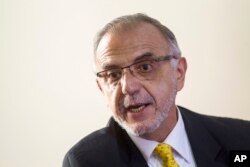The President-elect of Colombia, Gustavo Petrobegan very early -six days after his election- to name the ministers who will be part of his government.
However, two days after his inauguration, the appointments of 10 of the 18 ministers who will accompany him in his government are still missing. Between Friday and Saturday, the president-elect is expected to announce the names of the remaining ministers.
The first announcements
The first name that Petro communicated to public opinion for his cabinet was Álvaro Leyva, who will serve as foreign minister. Since 1980, the new Minister of Foreign Affairs has worked in the search for a negotiated solution to the armed conflict in Colombia. He was active during the peace process with the FARC in Havana, Cuba. According to Petro, it is a bid to have a “peace ministry”.
He was Minister of Mines and Energy of Colombia between 1984 and 1985, councilor of Bogotá, representative to the Chamber and senator.
For Sandra Borda Guzmán, a political analyst and professor of Political Science at the Universidad de los Andes, Leyva “has the peace process in mind. Probably, not so much in foreign policy, but rather the achievement of international alliances to support the peace process. complete peace that Gustavo Petro is initiating”.
Then, on June 28, Petro appointed José Antonio Ocampo, one of the most renowned economists in Colombia and who has the responsibility of carrying out a tax reform that solidifies the country’s finances, as finance minister. Ocampo has been Minister of Finance and Agriculture, and co-director of the Banco de la República, as well as executive secretary of the Economic Commission for Latin America and the Caribbean (ECLAC), and Assistant Secretary General of the United Nations for Economic and Social Affairs until 2007.
Later, Petro added Patricia Ariza to the list for the Ministry of Culture; Cecilia López for the Ministry of Agriculture; Susana Muhamad, Ministry of the Environment, and Carolina Corcho for the Ministry of Health and Social Protection.
Ariza is a poet, playwright, director and actress, co-founder of the Casa de la Cultura, today called Teatro la Candelaria, as well as founder of the Colombian Theater Corporation.
Lopez is an economist, She was Minister of the Environment and Director of National Planning. In addition to senator of the Republic and pre-candidate for the presidency in 2010, she also served as Ambassador of Colombia in the Netherlands and director of the ECLAC Employment Program between 1988 and 1990. She directed the Agriculture portfolio between 1996 and 1997 .
Muhammad is a political scientist and environmentalist. She has worked with Petro in the past. In 2012, she joined the Progressive movement that won the mayor’s office in Bogotá. There, she served as Secretary of the Environment; Under her charge, the Climate Change Plan was developed. She was also general secretary of the Mayor’s Office, after the departure of Orlando Rodríguez. Since 2020, she has been a councilor for Bogotá.
In the Health portfolio will be Carolina Corcho, vice president of the Colombian Medical Federation, who has been a consultant for the Pan American Health Organization and an evaluator for the United Nations Office on Drugs and Crime. During the Mayor’s Office of Gustavo Petro, she served as Undersecretary in charge of Territorial Management in Health.
His appointment has caused controversy, since he has criticized the role of the EPS Health Promoting Entities, as well as the complaints about the conditions of health personnel during the pandemic.
education and safety
Among the other positions are Alejandro Gaviria as Minister of Education and Iván Velásquez as Minister of Defense.
Gaviria was deputy director of Fedesarrollo and the National Planning Department. He also coordinated the preparation of the 2002-2006 Development Plan. He was a professor and dean of the Faculty of Economics at the Universidad de los Andes. Between 2012 and 2018 he was Minister of Health. He directed the Center for Sustainable Development Goals (CODS) for Latin America and the Caribbean, and has been rector of the Universidad de los Andes since 2019. He was recently a presidential candidate for the Centro Esperanza Coalition.
Velázquez, the new defense minister, is a lawyer. He held the position of Departmental Prosecutor of Antioquia, was an auxiliary magistrate in the Council of State, and regional director of Prosecutors in Medellín. He served as an auxiliary magistrate of the Supreme Court of Justice. In 2011, he received the World Human Rights Award from the International Bar Association (IBA). In 2013, Velásquez Gómez was appointed a member of the International Commission against Impunity in Guatemala, CICIG, at the level of deputy secretary general of the United Nations Organization.
For the internationalist Cesar Niño, Velázquez brings experience to the armed forces: “There will be a progressive change of discourse on relations, a reestablishment, this also in the face of a possible negotiation with the ELN,” he said.
According to Borda, the lawyer is not an expert on security issues, but he is knowledgeable about International Humanitarian Law, human rights, corruption and can put the Armed Forces in a position to achieve the pacification of the country.
The new government has spoken of promoting the creation of a Ministry of Equality, which would be led by the elected vice president, Francia Márquez, which would focus on legislating in favor of women and the Afro-Colombian population.
Connect with the Voice of America! Subscribe to our channel Youtube and turn on notifications, or follow us on social media: Facebook, Twitter and Instagram.















Add Comment